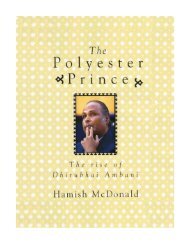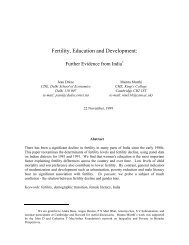The-Polyester-Prince
The-Polyester-Prince
The-Polyester-Prince
- No tags were found...
Create successful ePaper yourself
Turn your PDF publications into a flip-book with our unique Google optimized e-Paper software.
which involved boycotting imported factory made goods in favour of villagecraftwares such as home-spun cotton (khadi). Activities were to include meetings tosalute the proposed national fag of India-the saffron, white and green tricolour withthe ox-wagon wheel in the middle, which was then the Congress fag-as well asmotivation sessions and sports meetings for the other students.Vakharia became the president of the Sangh, with Dhirubhai and another studentcalled Praful Nanavati serving as secretaries. ‘e organised a lot of functions, likesaluting the national fag, and took a lot of risks,’ said Vakharia. At one time weprinted pamphlets with a photo of Gandhi, and with that we approached someleading citizens to be our sponsors-but no one agreed. In Junagadh at that time noone was allowed to even utter “Jai Hind” or “Vande Mataram” , or sing nationalsongs. Even wearing khadi made you a suspect in the eyes of the Nawab’s CID. In1946, the students learned that Kaniala Munsi, a lawyer who was later a leadingCongress Party politician and a minister in Nehru’s first government, would bevisiting Junagadh. <strong>The</strong>y decided to invite him to address their members in thecompound of a boarding house for lain students. <strong>The</strong> Nawab’s police summonedVakharia, Dhirubhai and Nanavati, and threatened the three with arrest, expulsionfrom school and trouble from their parents unless they gave an undertaking that nopolitical speech would be given.It is here that Dhirubhai shows a spark of his later genius at bringing apparentlyirreconcilable demands into an accommodation, if through a dubious intellectualism.“He had said that a literary figure would deliver a speech,’ said Vakharia. Dhirubhaiwhispered that there was nothing wrong in giving this undertaking. “We are notgoing to give the speech. If there is any breach in the undertaking, it’s a problembetween Munsi and the police.” Munsi came and delivered a rousing speech in favourof early independence.As 1947 wore on and partition of British India along Hindu Muslim communal linesbecame more likely, the political position of the princely states came under greatscrutiny. By August, when the transfer of British power was due, all the rulers cameunder pres-sure to accede to either India or Pakistan. In most of the more than 550states, the decision was clear-cut because of geographical position, the religion ofthe ruling family, and the predominant religion of the population.Three difficult cases stood out after ‘Freedom at midnight’ on 15 August. In Kashmir,contiguous with both India and Pakistan and with a Muslim majority, the Hindu rulerwavered. In the immensely wealthy and large central Indian state of Hyderabad,which had a Hindu majority, the Muslim Nizam had dreams of independence fromboth India and Pakistan. <strong>The</strong>n there was Junagadh, what the historian H. V Hodsoncalled ‘<strong>The</strong> joker in the pack’.Junagadh was close to the western side of Pakistan, and had a Muslim ruler. But itsfragmented territory was interlocked with that of neighbouring Hindu-ruled states,and its people were mostly Hindu. Moreover, it contained the great Hindu pilgrimagesites of Somnath and Dwarka.In 1946, the Nawab’s prime minister and closest adviser, the Diwan, had becomesick and gone into prolonged convalescence. Stepping into his shoes in May 1947 asacting Diwan came Sir Shah Nawaz Bhutto, a politician from Sindh active in theMuslim League of Mohammad Ali Jinnah, the father of Pakistan. (Bhutto himself wasthe father and grandfather of two later prime ministers of Pakistan, Zulfikir Ali Bhuttoand Benazir Bhutto.) Bhutto kept in close touch with Jinnah and had the Nawab obey




